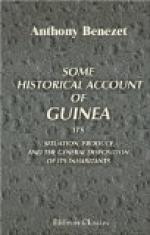How then is the slave-holder to secure what he esteems his property? Perhaps he will endeavour clandestinely to seize the supposed slave, in order to transport him (with or without his consent) to the colonies, where such property is allowed: but let him take care what he does, the very attempt is punishable; and even the making over his property to another for that purpose, renders him equally liable to the severe penalties of the law, for a bill of sale may certainly be included under the terms expressed in the Habeas Corpus act, 12th Sect. viz. “Any warrant or writing for such commitment, detainer, imprisonment, or transportation,” &c. It is also dangerous for a counsellor, or any other person to advise (see the act “shall be advising”) such proceedings, by saying, “That a master may legally compel him (the slave) to return again to the plantations.” Likewise an attorney, notary-public, or any other person, who shall presume to draw up, negotiate, of even to witness a bill of sale, or other instrument for such commitment, &c. offends equally against the law, because “All, or any person or persons, that shall frame, contrive, write, seal, or countersign any warrant or writing for such commitment, detainer, imprisonment, or transportation; or shall be advising, aiding, or assisting in the same, or any of them,” are liable to all the penalties of the act. “And the plaintiff, in every such action, shall have judgment to recover his treble costs, besides damages; which damages so to be given shall not be less than five hundred pounds;” so that the injured may have ample satisfaction for their sufferings: and even a judge may not direct or instruct a jury contrary to this statute, whatever his private opinion may be concerning property in slaves; because no order or command, nor no injunction, is allowed to interfere with this golden act of liberty.
—I have before observed, that the general term, “every alien,” includes all strangers whatsoever, and renders them subject to the King, and the laws, during their residence in this kingdom; and this is certainly true, whether the aliens be Turks, Moors, Arabians, Tartars, or even savages, from any part of the world.—Men are rendered obnoxious to the laws by their offences, and not by the particular denomination of their rank, order, parentage, colour, or country; and therefore, though we should suppose that any particular body of people whatsoever were not known, or had in consideration by the legislature at the different times when the severe penal laws were made, yet no man can reasonably conceive, that such men are exempted on this account from the penalties of the said laws, when legally convicted of having offended against them.




